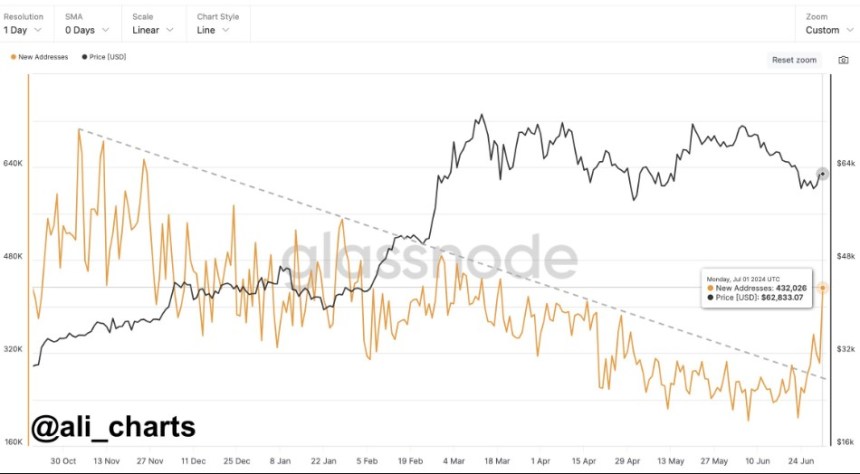Recently, the price of Bitcoin (BTC) has entered a consolidation phase, fluctuating between $61,000 and $62,000 after a brief drop to $58,000 on June 24. While retail investors have shown renewed interest alongside institutional counterparts, the market faces a mix of bullish signs and potential headwinds.
Retail Investors Return To Bitcoin
In a recent social media post, crypto analyst Ali Martinez highlights the resurgence of retail investors, as evidenced by a four-month high in new BTC addresses reaching 432,026, adding to the sentiment that investors are betting on a significant price increase for BTC in the coming months, despite recent price volatility.

In a separate post analyzing BTC’s recent price action, Martinez also suggested that the largest cryptocurrency on the market is currently confined within a parallel channel, with a potential rebound to $63,200 or $63,800 if the lower bound at $62,500 holds.
In particular, Martinez cites the critical resistance areas of $65,795 and $78,700 as key targets if BTC breaks above them.
However, not all news is positive for the Bitcoin market. In the past 72 hours, BTC miners have sold over 2,300 BTC worth approximately $145 million. This selling pressure adds to the US and German governments’ ongoing sell-off of confiscated BTC.
Mining Industry Under Pressure
The mining industry faces challenges due to lower network fees and reduced block rewards resulting from the Halving event in April.
Kaiko Research notes that average network fees have decreased from $3 to $5, a significant drop from around $45 in January. The halving saw block rewards reduce from 6.25 BTC to 3.125 BTC, impacting miner revenue.
This revenue squeeze has put pressure on miners, eroding profitability while fixed expenses such as energy, wages, and rent remain constant. The decline in network fees has further contributed to the reduction in revenue.
Historically, Bitcoin price rallies following Halving events have helped miners compensate for the drop in rewards. However, the price of Bitcoin has remained relatively unchanged since the April 19 software update.
In April, fees briefly surged to nearly $150 due to the increased minting of non-fungible tokens (NFTs) on the BTC blockchain. Although this temporarily relieved miners, fees have since returned to average levels.
According to Bloomberg, Marathon Digital, one of the largest Bitcoin miners, sold 390 BTC in May and plans to sell more tokens to manage its finances.
Kaiko Research warns that the risk of forced selling by miners may persist in the coming months. As a result, the industry is expected to witness consolidation as miners seek to “consolidate assets” and “increase efficiency.”
Notable examples include miner Riot Blockchain’s “hostile takeover attempt” of Bitfarms Ltd. and CleanSpark Inc.’s recent agreement to acquire Griid Infrastructure Inc. for $155 million in an all-stock transaction.
At the time of writing, BTC is still consolidating within its range at $61,880, down 2% in the 24-hour time frame, wiping out all gains in the past 30 days, as losses in this time frame amount to 9%.
Featured image from DALL-E, chart from TradingView.com
#BitcoinNews, #Bitcoin, #BitcoinHalving, #BitcoinMinerDump, #BitcoinMinerSelling, #BitcoinNews, #BitcoinPrice, #Btc, #Btcusd, #BtcusdPrice, #BTCUSDT, #Crypto, #CryptoNews